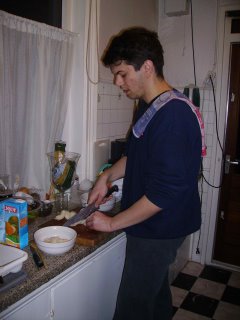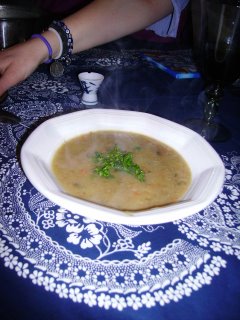 My Czech linguist host, František has somehow created the stage for a
Babylonian scene; English, Dutch, Czech and Indonesian are spoken in
rapid succession.
My Czech linguist host, František has somehow created the stage for a
Babylonian scene; English, Dutch, Czech and Indonesian are spoken in
rapid succession.František himself does research on the languages of Indonesia, his friend Ivana has spent time there as an anthropologist, and their friend Gershon is from Papua and worked at the museum of Ethnology in Leiden. Wow!
But the first moments of the evening I get to spend alone with František (Franti for short) and he shows me the thick cookbook his mother gave him. As many male expats, he only learnt how to prepare typical dishes after leaving his country. At home, his sisters helped mom cook and bake...especially on Saturday, "baking day", as traditionally, one is supposed to have enough treats for all the Sunday visitors. František sometimes misses the "open" culture back home, where he could always drop in at a friend's place without calling in advance.
 After Ivana and Gershon arrive, we start the meal with some "comfort food", bramborová polévka,
a hearty potato soup with forest mushroom and lots of other vegetables.
It tastes great, but according to the cook, it will be even better
tomorrow, when the flavors will be more intense.
After Ivana and Gershon arrive, we start the meal with some "comfort food", bramborová polévka,
a hearty potato soup with forest mushroom and lots of other vegetables.
It tastes great, but according to the cook, it will be even better
tomorrow, when the flavors will be more intense.For the next course we head to the kitchen to witness the
 preparations.
I am impressed by Franti's professional chopping of the apples. He
learnt the technique in his part-time job at a Mediterranean restaurant
in Nijmegen (where he did his MA). The apples go into our sweet main
course; žemlovka, a kind of oven baked french toast with fruit
and raisins. Just pour an egg and milk mixture over old bread and throw
in some chopped apples.
preparations.
I am impressed by Franti's professional chopping of the apples. He
learnt the technique in his part-time job at a Mediterranean restaurant
in Nijmegen (where he did his MA). The apples go into our sweet main
course; žemlovka, a kind of oven baked french toast with fruit
and raisins. Just pour an egg and milk mixture over old bread and throw
in some chopped apples.František and Ivana are the first people in my project that can remember life in a communist country (Andi and Ildi from Hungary were too young...), so I am very interested in how that was for them. According to Ivana, it wasn't that bad for kids: the communist government organized a lot of activities and camps for the children. František recalls monthly military exercises in the forest. All the kids would don gas masks and raincoats to prepare for a (fictional) gas attack. Also plastic bags around the hands, which you were supposed to remove with little twigs to avoid contact with the "contaminated" plastic. Franti mostly remembers this as being silly, but good fun. The boys would also practice shooting, and because František was good enough, he was allowed to handle a Kalashnikov. And he was only thirteen or fourteen at the time!
He says he was afraid of Americans, he mostly pictured them as soldiers. Till one day he went to a concert of an American youth choir! The whole show he kept looking at one of the girls singing, she was so pretty...they exchanged addresses afterwards, but nothing much came of it. But at least his image of Americans as soldiers was changed in this one evening. Ivana also says her first contact with Americans was a group, singing Queen songs at her school. As one of the negative aspects of the communist era, she remembers how difficult it was to buy exotic fruits. Her grandfather waited in line for two hours once, just to buy half a kilo of bananas!
And František mentions how being (openly) Catholic could make life difficult under an atheist regime. During biology class, his teacher would explain about evolution and then teasingly say: "But František doesn't believe that, does he now?"
Also, it would have been difficult to get into university and get a good job as a Catholic. But the Velvet Revolution (1989) came before that could have an impact on Franti. Examples of small changes were Donald Duck on tv on Sunday, and the availability of some new kinds of vegetables in the winter. These were so new, that media campaigns were set up to teach the Czech how to prepare them!
After dinner I linger and check out Franti's laptop. Melancholic Czech music from the computer has accompanied our meal, but now my attention is caught by the slide show with dozens of photos of one very pretty Chinese girl. It turns out to be Franti's girlfriend from Hong Kong, a fellow researcher...he has to be content with photos till July, when she will return to the Netherlands. Who knows if I can arrange a Chinese meal then?
(The original post about this meal is from March 21, 2006)
I note the following . . . "the Velvet Revolution (1968)" . . .
ReplyDeleteIs that extreme mistake deliberate or accidental?
Accidental! Velvet Revolution (1989) got mixed up with Prague Spring (1968)! Thanks for picking up on that, has been corrected now.
ReplyDelete